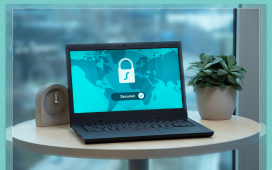
Tulane expert Ashley Nelson weighs in on the argument on whether TikTok should be banned in U.S., but also offers up a unique solution. (Photo courtesy of Shutterstock)
TikTok, the popular Chinese-owned social media app, has become a target for state and federal lawmakers over the past two years because of privacy and security risks. They are concerned that the Chinese company that owns TikTok, ByteDance, could share information from its more than 100 million American users with the Chinese government.
More than a dozen states have banned TikTok from government-issued devices, while congress, state lawmakers, college campuses and cities have adopted or considered rules to outlaw the app. TikTok proponents have argued banning the app would infringe on their First Amendment rights to free speech, and the matter would go to the Supreme Court.
Ashley Nelson, senior professor of practice at Tulane’s A. B. Freeman School of Business, says that the government could try to ban TikTok in some states. Public schools and companies have forbidden employees from using the app on their networks or equipment. “The President can issue an executive order to ban TikTok, or this can go through the proper channels, but it will eventually be challenged at some point,” she says.
“The EU is onto something when they’re (EU members) protected by saying you can’t sell the data. If our government had this condition in place, no one would be selling user data.”
– Ashley Nelson
Sen. Marco Rubio (R-FL), Mike Gallagher (R-Wisc.) and Raja Krishnamoorthi (D-Ill.) have proposed legislation to ban the social media app in the interests of national security. Several tech giants, including competitors Meta (Facebook, Instagram) and Microsoft Corp, have also argued that TikTok presents privacy risks.
“Lawmakers in both parties have expressed concern. If they could have 100% proof that this has happened, draw a solid line between users and China and obtain the data multiple times, they can build a case on why it needs to be banned. They would also need Apple and Google to remove the apps from their platforms. On the flip side, what’s to prevent other countries from coming after U.S.-based social platforms and making the same accusation,” Nelson says.
Nelson believes the solution for both sides is to follow standards established by European Union (EU).
“The EU has strict controls over many different issues with regard to the internet and social media technologies. Any company with a web or social media presence in the EU cannot resell its user’s data. They’re heavily fined if they do so. We’re talking about billions of dollars of fines over the years. Companies had five years to work in a program so that the data would no longer be shared. The EU is onto something when they’re protected by saying you can’t sell the data. If our government had this condition in place, no one would be selling user data,” Nelson said.











